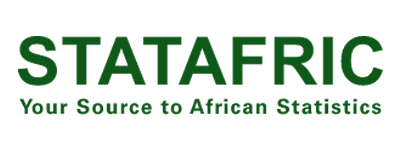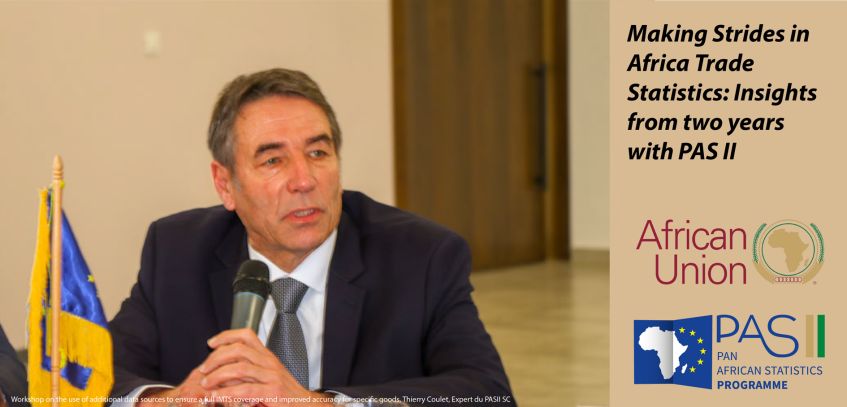Over the past two years, the EU-funded Pan-African Statistics Programme II (PAS II) has embarked on an ambitious journey to enhance the landscape of International Trade in Goods and Services (ITGS) statistics in African Union (AU) Member States. Spearheaded by a dedicated team and led by key expert Mr. Thierry Coulet, the project has achieved a lot already.
Trade statistics is a priority area for the PAS II Service Contract (PAS SC), and central is the empowerment of National Statistical Offices (NSOs) in Africa. By enhancing their capabilities in ITGS, the PAS II SC aims to enable NSOs compiling and disseminating good quality trade statistics.Additionally, the objective is to enhance their ability to fulfill a more impactful coordinating role within their respective countries. This involves integrating data inputs from diverse national entities such as Customs administrations, Central Banks, and Trade Ministries.
- “NSOs are, or should be, the national statistical system coordinators, a role that is difficult to assume in a statistical area like ITGS where there are many actors. In PAS II SC, we believe that by supporting the development of NSOs they will be in a better position to fully play their full role in cooperating with the various providers of statistical information in this area”, says Mr. Coulet.
- - NSIs are, or should be, the coordinators of national statistical systems, a difficult role to assume in a statistical field like ITGS where there are many players. In PASII SC, we believe that by supporting the development of NSIs, they will be in a better position to play their full role in cooperating with the various providers of statistical information in this field", says Mr. Coulet.
Concrete goals achieved
The PAS II SC has a number of concrete objectives for improving the trade statistics of African national statistical offices. The most important is to assist all AU Member States to fully implement the IMTS 2010 standard conceptual framework in the compilation of their trade statistics. This goal is well underway, including the search for the right data sources and the adaptation of quality frameworks.
- Additional data sources exist in AU Member States that should complement traditional customs data in the compilation of ITGS, hence improving the coverage of these statistics. The PAS II SC provides support in this area. Also, a Data Quality Assurance Framework has been developed for the management of the AU Institute for Statistics (STATAFRIC) trade statistics database known as Africatrade. “It will be adapted to the national context and will be popularized, allowing countries to carry out early quality checks and to improve the quality of their ITGS”, says Mr Coulet.
Technical assistance is provided in the form of technical support missions to specific countries, in particular to help them use the Eurotrace software.
- “Several missions have been implemented with a view to help countries use the Eurotrace software, a standard software used to produce ITGS based on Customs data. Here, many countries struggle to get on board”, explains Mr Coulet.
The update and enhancement of guidelines for the compilation of informal cross-border trade (ICBT) statistics and trade indices have also provided countries with essential tools for data analysis.
More and better analyses
In the next years, one of the priorities for the Member States of the African Union and STATAFRIC, will be to develop analytical capacities in the African statistical system.
- “Future priorities will be related to the development of analytical capacities of AU Member States in relation to ITGS. Developments of e-learning modules within the PAS II e-learning platform—The PAS Academy, and writing and publishing analyses through the PAS publishing house should enable AU Member States to analyse the impact of specific trade agreements on their economies or the interrelations between international trade and the Sustainable Development Goals (SDGs”), says Mr Coulet.
Other priorities along these lines are also to have the Africatrade database available online in a user-friendly environment and to regularly update the African trade statistics yearbook.
Striving towards harmonization of African trade statistics
The main overarching goal of the work carried out by STATAFRIC and the NSOs of the AU Member States on trade statistics, is to have harmonized data from all African countries to better measure development on the continent.
- “Harmonisation is indeed at the core of all the previously mentioned activities with the development of common guidelines and a quality assurance framework, implementation and efficient use of EUROTRACE. And fortunately, progress in all these respects is tangible”, explain Mr. Coulet.
However, obstacles are numerous and relate to the extreme diversity of the countries, in terms of size, population, trade openness, importance and composition of international trade, and also in terms of statistical capabilities, data availability and implementation of international methodologies.
“This makes collective events more difficult to manage but they become more enriching as well”, says an optimistic Thierry Coulet









